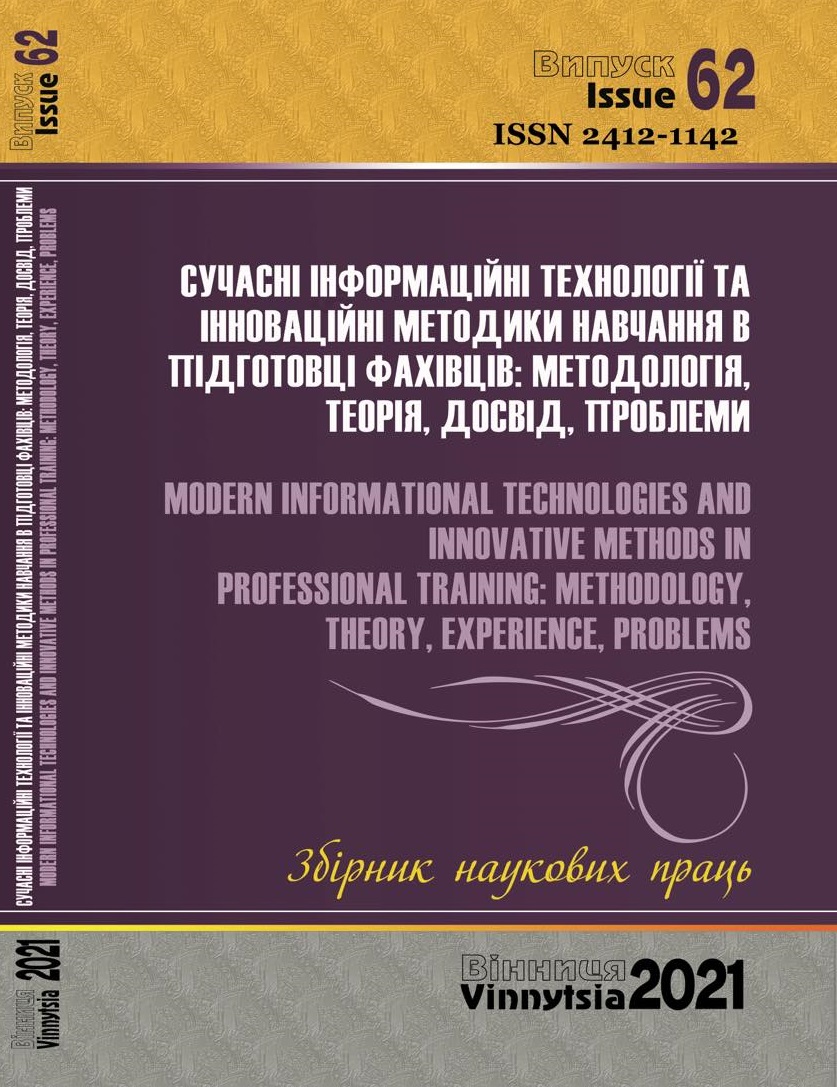METHODOLOGICAL APPROACHES TO THE ORGANIZATION OF DESIGN EDUCATION
DOI:
https://doi.org/10.31652/2412-1142-2021-62-265-274Keywords:
design education, design activity, constructive methodology, methodological approaches in design education, German experience, professional training of designersAbstract
The article demonstrates that in our time the paradigm of design activity has changed
significantly. If before the object of research was the subject of the designer, now he begins his work by
posing problems related to technology, resources, human psychology, local traditions, world trends and
more. The designer must be able to see these problems, analyze their structure, identify different solutions,
develop algorithms for solving, anticipate the possible consequences. All of these skills require a broad
outlook and research skills from the designer.
Analysis of the features of modern professional design activities and publications on the requirements for
the professionalism of modern designers gives grounds to conclude that for success in this area, professional
training of designers should be carried out on the basis of a new design methodology.
Based on the analysis of the works of German scientists on the impact of design on the development of modern society, it is shown that in Germany in the designers’ training design is perceived as an academic
discipline with an independent scientific basis that has its own methodology.
Based on the study of successful practical experience of design and design education in Germany, the main
methodological approaches have been identified, which should be implemented in the training of future
designers in Ukraine. In order to change the situation and prepare a competitive designer, it is proposed to
use the following methodological approaches in design education: systemic, synergetic, civilizational,
globalization, culturological, ethnological, axiological, personal, activity, acmeological, competence,
integrative, heuristic, heuristic oriented.
Downloads
References
Швець О. А., Громов Є. В., Коломієць А. М., Коломієць Д. І. Нові функції дизайну в епоху цифровізації та
перспективи розвитку дизайн-освіти: аналіз світового досвіду. Наукові записки Вінницького державного
педагогічного університету імені Михайла Коцюбинського. Серія: Педагогіка і психологія. 2021. Вип.67.
С.56-64.
Bürdek B. E. Design: Geschichte, Theorie und Praxis der Produktgestaltung. Basel: Birkhauser-Verlag. 2005.
Bürdek B. E. Design in der Krise. Hochparterre, 2008. No5: S.66–68.
Bürdek B. E. Design – auf dem Weg zu einer Disziplin, Schriftenreihe Schriften zur Kulturwissenschaft 94,
Hamburg 2012.
Bürdek B. E. Design – eine Disziplin? Interview von F. Romero-Tejedor. Öffnungszeiten. Papiere zur
Designwissenschaft 26/2012, Kassel 2012. S. 4–13.
Noel G. We All Want High-Quality Design Education: But What Might That Mean? She Ji: The Journal of Design,
Economics, and Innovation. Vol. 6, Issue 1, 2020. P.5-12.
Meyer M. W., Norman D. Changing Design Education for the 21st Century. She Ji: The Journal of Design,
Economics, and Innovation, Volume 6, Issue 1, 2020. P.13-49.
Valtonen A. Approaching Change with and in Design. She Ji: The Journal of Design, Economics, and Innovation,
Volume 6, Issue 4, 2020. P.505-529.
Melles G., Woelfel C. Postgraduate Design Education in Germany: Motivations, Understandings and Experiences
of Graduates and Enrolled Students in Master's and Doctoral Programmes. The Design Journal. 2014. 17(1).
P.115–135.
Janjamlah T., Kaewlai P. Design Research Methodology: Knowledge Inquiry Through Constructive Design
Research. JARS – Journal of Architectural / planning Research and Studies. 2020. 17(1). P.91-102.
Liefner I., Schatzl L., Schroder T. Reforms in German higher education: Implementing and adapting Anglo-
American organizational and management structures at German universities. Higher Education Policy. 2004.17(1).P. 23–38.
Lindberg T. Design Thinking Diskurse. Bestimmung, Themen, Entwicklungen (doctoral dissertation). University
of Potsdam, Potsdam, Germany. 2014.
Lloyd P. You Make It and You Try It Out: Seeds of Design Discipline Futures. Design Studies. Vol. 65, 2019.
P.167-181.
Romero-Tejedor F., Jonas W. (eds). Positionen zur Designwissenschaft. Kassel: Kassel University Press. 2010.
p.
Schwarz-Hahn S., Rehburg M. Bachelor und Master in Deutschland: empirische Befunde zur
Studienstrukturreform. Munster: Waxmann Verlag. 2004.
Коломієць А. М., Лазаренко Н. І. Сучасні методологічні підходи в організації вищої педагогічної освіти.
Науковий вісник Південноукраїнського національного педагогічного університету імені
К. Д. Ушинського. 2016. Вип. 3(110). С.47-52.
Lazarenko N., Kolomiets A., Klymenko A. Symbiosis of methodological approaches to the development of
education in the information society. Sciense and Education. 2017. Issues 4. P.107-112.
Cezzar J. Teaching the Designer of Now: A New Basis for Graphic and Communication Design Education. She
Ji: The Journal of Design, Economics, and Innovation. 2020, Volume 6, Issue 2. P.143-151.
Світлична О. Етнографічні інтерпретації у творчості молодих вітчизняних фахівців графічного дизайну.
Вісник Львівської національної академії мистецтв. 2016. Вип. 30. С.206-215.
Трегуб Н. Є. Етностилізації як напрямок дизайн-освіти меблярів. Вісник ХДАДМ. 2007, No 6. С.174-179.
Downloads
Published
Issue
Section
License
Copyright (c) 2021 Алла Коломієць, Олена Швець, Дмитро Коломієць, Юрій Бабчук

This work is licensed under a Creative Commons Attribution 4.0 International License.

